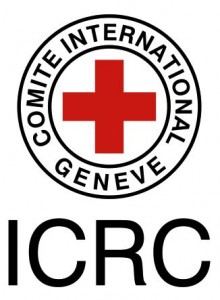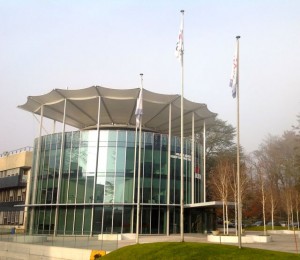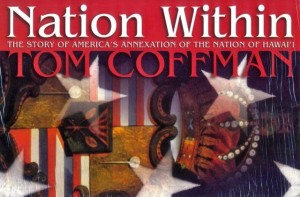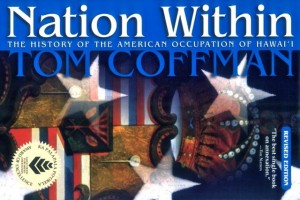In Hawai‘i there is a political trend called the sovereignty or independence movement that began in the 1970s. This political wing, which grew out of the Hawaiian cultural renaissance movement, is comprised of diverse groups of aboriginal Hawaiians working toward the goal or aspiration of achieving sovereignty or independence. These groups vary in ideologies and organization, but all of them have been operating on the false assumption that the United States has independence and sovereignty over Hawai‘i and therefore the goal is separation or secession through a process commonly referred to as self-determination. According to the United Nations, self-determination is the right of the people of a non-sovereign nation to choose their own form of governance separate from the foreign State that has the sovereignty and independence under international law.
Actions taken by these groups are centered on political activism that have taken many forms at both the national and international levels. This political trend has led to confusion regarding Hawai‘i’s true status and basic terminology and the application of the terms “sovereignty” and “independence.” Also adding to the confusion is the psychological effects of “presentism” and “confirmation bias.” Presentism is “an attitude toward the past dominated by present-day attitudes and experience,” and confirmation bias is “a tendency to search for or interpret information in a way that confirms one’s preconceptions, leading to statistical errors.”
Sovereignty by definition is absolute authority exercised by a State over its territory, territorial seas, and its nationals abroad, which is independent of other States and their authority over their territory, territorial seas, and its nationals abroad. Authority over a State’s nationals abroad is called personal supremacy, and authority over territory is territorial sovereignty. Therefore, sovereignty is associated with political independence and the terms are often interchangeable.
The term State, under international law, means a political unit that has a centralized government, a resident population, a defined territory and the ability to enter and maintain international relations with other States. A State is a legal person in international law that possesses rights and obligations. A nation, however, is a group of people bound together by a common history, language and culture. Every State is a nation or a combination of nations, but not every nation or nations comprise a State. Since the nineteenth century, a State comes into existence only if other States have recognized it, which represents the entirety of the international order. In other words, a few States may have given explicit recognition, but the majority hasn’t. Until the majority of States have provided recognition to the nation or group of nations, international law does not recognize the new State because its independence over its territory, territorial seas, and its nationals abroad has not been acknowledged by the international community of States.
The most recent example of a sovereignty movement by a nation seeking State sovereignty and independence and ultimately achieving it was Palestine. On November 29, 2012, the member States of the United Nations voted overwhelmingly to recognize Palestinian Statehood. Up to this date, Palestine was a nation seeking sovereignty and independence, which is called self-determination. Once a State has been recognized the recognizing States cannot deny it later, and there exists a rule of international law that preserves the independence of an already recognized State, unless that State has relinquished its independence and sovereignty by way of a treaty or customary practice recognized by international law.
According to the Permanent Court of International Justice (PCIJ), in the 1927 seminal case S.S. Lotus between France and Turkey, “International law governs relations between independent States. The rules of law binding upon States therefore emanate from their own free will as expressed in conventions (treaties) or by usages generally accepted as expressing principles of law and established in order to regulate the relations between these co-existing independent communities or with a view to the achievement of common aims. Restrictions upon the independence of States cannot therefore be presumed.” In other words, once a State is acknowledged as being independent it will continue to be independent unless proven otherwise. Therefore, the State will still have sovereignty and independence over its territory, territorial seas, and its nationals, even when its government has been overthrown and is militarily occupied by a foreign State. During occupations the sovereignty remains vested in the occupied State, but the authority to exercise that sovereignty is temporarily vested in the occupying State, which is regulated by the Hague and Geneva Conventions, and international humanitarian law.
When the PCIJ stated that restrictions upon the independence of States could not be presumed, it did not mean that international law could not restrict States in its relations with other States that are also independent. In the Lotus case, the PCIJ explained, “Now the first and foremost restriction imposed by international law upon a State is that—failing the existence of a permissive rule to the contrary—it may not exercise its power in any form in the territory of another State. In this sense jurisdiction is certainly territorial; it cannot be exercised by a State outside its territory except by virtue of a permissive rule derived from international custom or from convention (treaty).” The PCIJ continued, “In these circumstances, all that can be required of a State is that it should not overstep the limits which international law places upon its jurisdiction; within these limits, its title to exercise jurisdiction rests in its sovereignty.”
The United States Supreme Court in 1936 recognized this restriction and limitation of a State’s authority in international law in U.S. v. Curtiss-Wright Corp. The U.S. Supreme Court stated, “Neither the Constitution nor the laws passed in pursuance of it have any force in foreign territory unless in respect of our own citizens…, and operations of the nation in such territory must be governed by treaties, international understandings and compacts, and the principles of international law. As a member of the family of nations, the right and power of the United States in that field are equal to the right and power of the other members of the international family. Otherwise, the United States is not completely sovereign.”
In 2001, the Permanent Court of Arbitration (PCA), in its dictum in Larsen v. Hawaiian Kingdom, verified Hawai‘i to be an independent State. In its arbitral award, the PCA stated, “in the nineteenth century the Hawaiian Kingdom existed as an independent State recognized as such by the United States of America, the United Kingdom and various other States, including by exchanges of diplomatic or consular representatives and the conclusion of treaties.” As an independent State, international law provided a fundamental restriction on all States, to include the United States of America, that it may “not exercise its power in any form in the territory of another State.”
Since 1898, the United States has unlawfully exercised its power within the territory of the Hawaiian Kingdom militarily, legislatively and economically. On July 7, 1898, the United States Congress enacted a joint resolution unilaterally annexing the Hawaiian Kingdom over the protests of Hawai‘i’s Queen and people. Two years later, Congress enacted another law by creating a territorial government that took over the governmental infrastructure of the Hawaiian Kingdom that was previously high jacked by insurgents since 1893 with the support of the United States military. In 1959, the Congress again passed legislation transforming the territorial government into the 50th state of the American Union. Under both international law and United States constitutional law, these Congressional actions have no force and effect in Hawai‘i. Despite the propaganda and lies that have been perpetuated since the beginning of the occupation that Hawai‘i was annexed by a treaty, the Hawaiian Kingdom continues to be an independent State that still retains its personal supremacy over its nationals abroad, and territorial sovereignty over its territory and territorial seas. The exercising of this authority, however, is limited only by the Hague and Geneva Conventions and the fact of an illegal and prolonged occupation.
A common statement made by sovereignty advocates is that the people have to collectively decide on the question of sovereignty and that it should be put to a vote. This is incorrect if Hawai‘i is already a sovereign and independent State. This prospect is valid only if Hawai‘i is a nation seeking sovereignty and independence, which is commonly referred to as “nation-building” under a people’s right to self-determination, but Hawai‘i is not. Self-determination and nation-building is the United Nations process by which sovereignty and independence is sought, but it is not guaranteed. This process provides to the people of a non-sovereign nation who have been colonized by a foreign State to choose whether or not they want independence from the foreign State, free association as an independent State with the foreign State, or total incorporation into the foreign State.
Recently, Maohi Nui (French Polynesia) has been reaffirmed by the United Nations as having a right to choose independence from France, free association with France, or total incorporation into France. Maohi Nui is by definition a sovereignty movement and education is key to ensuring that the people decide Maohi Nui’s status through decolonization with full knowledge, and not be influenced or coerced by political activism that is French driven. It won’t be easy for Maohi Nui, but the process of exercising self-determination should be fair under United Nations supervision and in line with General Assembly resolutions.
If other independent States cannot affect or change the independence of an established State and its sovereignty under international law, how can Hawai‘i’s people believe they can do what States can’t? Because the Hawaiian Kingdom continues to exist under international law as an independent State, not only is the sovereignty movement rendered irrelevant, but also the status of Hawai‘i as an occupied State renders the State of Hawai‘i government and other federal agencies in the Hawaiian Islands self-proclaimed. It is within this international legal framework that actions taken by Federal government officials, State of Hawai‘i government officials, and County government officials are being reported to international authorities for war crimes under the Hague and Geneva Conventions, and the Rome Statute that established the International Criminal Court.
Re-education is crucial for Hawai‘i’s people and the world on the reality that Hawai‘i is an already independent and sovereign State that has been under an illegal and prolonged occupation. Before restoration of the de jure Hawaiian government takes place in accordance with the 1893 executive agreements, international law mandates that the occupying Power must establish a military government in order to administer Hawaiian Kingdom law (Article 43, Hague Convention, IV) and to also begin the withdrawal of all military installations from Hawaiian territory (Article 2, Hague Convention, V). This is the first and primary step toward transition.
The following terms and definitions are from the Hawaiian history textbook “Ua Mau Ke Ea-Sovereignty Endures.”
Independent State—A state that has absolute and independent legal and political authority over its territory to the exclusion of other states. Once recognized as independent, the state becomes a subject of international law. According to United States common law, an independent State is a people permanently occupying a fixed territory bound together by common law habits and custom into one body politic exercising, through the medium of an organized government, independent sovereignty and control over all persons and things within its boundaries, capable of making war and peace and of entering into international relations with other communities around the globe.
Sovereignty—Supreme authority exercised over a particular territory. In international law, it is the supreme and absolute authority exercised through a government, being independent of any other sovereignty. Sovereignty, being authority, is distinct from government, which is the physical body that exercises the authority. Therefore, a government can be overthrown, but the sovereignty remains.
Colonization—Colonization is the building and maintaining of colonies in one territory by people from another country or state. It is the process, by which sovereignty over the territory of a colony is claimed by the mother country or state, and is exercised and controlled by the nationals of the colonizing country or state. Though colonization there is an unequal relationship between the colonizer and the native populations that reside within its colonial territory. These native populations are referred to as indigenous peoples and form the basis of the 2007 United Nations Declaration on the Rights of Indigenous Peoples.
De-colonization—De-colonization is the political process by which a non-self-governing territory under the sovereignty of the colonizing state or country becomes self-governing. According to the United Nations Resolution 1541 (XV), Principles which should guide Members in determining whether or not an obligation exists to transmit the information called for under Article 73 e of the Charter, “A Non-Self-Governing Territory can be said to have reached a full measure of self government by: (a) Emergence as a sovereign independent State; (b) Free association with an independent State; or (c) Integration with an independent State.”
Self-determination—A principle in international law that nations have the right to freely determine their political status and pursue their economic, social and cultural development. The international community first used the term after World War I where the former territorial possessions of the Ottoman Empire and Germany were assigned to individual member countries or states of the League of Nations for administration as Mandate territories. The function of the administration of these territories was to facilitate the process of self-determination whereby these territories would achieve full recognition as an independent and sovereign state. After World War II, territories of Japan and Italy were added and assigned to be administered individual member countries or states of the United Nations, being the successor of the League of Nations, and were called Trust territories. Also added to these territories were territories held by all other members of the United Nations and called Non-self-governing territories. Unlike the Mandate and Trust territories, they were not assigned to other member countries or states for administration, but remained under the original colonial authority who reported yearly to the United Nations on the status of these territories. Self-determination for Non-self-governing territories had three options: total incorporation into the colonial country or state, free association with the colonial country or state, or complete independence from the colonial country or state. Self-determination for indigenous peoples does not include independence and is often referred to as self-determination within the country or state they reside in.
Sovereignty movement—A political movement of a wide range of groups in the Hawaiian Islands that seek to exercise self-determination under international law as a Non-self-governing unit, or to exercise internal self-determination under the 2007 United Nations Declaration on the Rights of Indigenous Peoples. The commonality of these various groups is that their political platforms are based on aboriginal Hawaiian identity and culture and use of the United Nations term indigenous people. The movement presumes that the Hawaiian Kingdom and its sovereignty were overthrown by the United States January 17th 1893, and therefore the movement is seeking to reclaim that sovereignty through de-colonization. The movement does not operate on the presumption of continuity of the Hawaiian Kingdom as an independent state and the law of occupation, but rather on the aspiration of becoming an independent state or some form of internal self-determination within the laws of the United States.
 On December 17, 2013, Dr. David Keanu Sai and attorney Dexter Kaiama had a meeting with Stephane Ojeda, Deputy Head of Operations for the Americas for the International Committee of the Red Cross (ICRC) at the ICRC’s headquarters in Geneva, Switzerland. The ICRC is a humanitarian organization that has a specific mandate in the 1949 Geneva Conventions to provide protection for civilians during international conflicts and occupations. At a Conference on the Politics of Humanitarianism in the Occupied Territories held in Israel in 2004, Mr. Ojeda described the ICRC as “guardians of international humanitarian law” and independent of political influences.
On December 17, 2013, Dr. David Keanu Sai and attorney Dexter Kaiama had a meeting with Stephane Ojeda, Deputy Head of Operations for the Americas for the International Committee of the Red Cross (ICRC) at the ICRC’s headquarters in Geneva, Switzerland. The ICRC is a humanitarian organization that has a specific mandate in the 1949 Geneva Conventions to provide protection for civilians during international conflicts and occupations. At a Conference on the Politics of Humanitarianism in the Occupied Territories held in Israel in 2004, Mr. Ojeda described the ICRC as “guardians of international humanitarian law” and independent of political influences. protected persons in the Hawaiian Islands as defined under the Fourth Geneva Convention and the Protocol (1) Additional to the Geneva Conventions of 12 August 1949, as well as United States citizens, who are not protected persons under the Convention and Protocol, but do have rights protected under Title 18, United States Code, §2441 (War Crimes Act) that has force in territories occupied by the United States. These violations include deprivation of a fair and regular trial, pillaging of real and personal property, and unlawful confinement. Mr. Kaiama has represented over 150 clients in both Federal and State of Hawai‘i courts of the Hawaiian Islands centering on these violations. The majority of these clients are also clients of Laulima Title Search & Claims, LLC, to include the company’s president, Mr. Kale Gumapac.
protected persons in the Hawaiian Islands as defined under the Fourth Geneva Convention and the Protocol (1) Additional to the Geneva Conventions of 12 August 1949, as well as United States citizens, who are not protected persons under the Convention and Protocol, but do have rights protected under Title 18, United States Code, §2441 (War Crimes Act) that has force in territories occupied by the United States. These violations include deprivation of a fair and regular trial, pillaging of real and personal property, and unlawful confinement. Mr. Kaiama has represented over 150 clients in both Federal and State of Hawai‘i courts of the Hawaiian Islands centering on these violations. The majority of these clients are also clients of Laulima Title Search & Claims, LLC, to include the company’s president, Mr. Kale Gumapac. the meeting centered on Hawai‘i’s status as an independent State and whether or not international law provided for its continued existence or its demise. In order for the ICRC to exercise its mandate to ensure protection for civilians during a prolonged occupation as requested by Mr. Kaiama, the ICRC needs to determine how the intervention will take place. Dr. Ferraro assured Mr. Kaiama that he would complete his recommendation by March 2014, and report his conclusion to Mr. Ojeda. Dr. Sai provided his legal brief titled “The Continuity of the Hawaiian State and the Legitimacy of the acting Government of the Hawaiian Kingdom,” and other pertinent documents to assist Dr. Ferraro in his review. Dr. Sai specifically drew attention to a section of the legal brief that states:
the meeting centered on Hawai‘i’s status as an independent State and whether or not international law provided for its continued existence or its demise. In order for the ICRC to exercise its mandate to ensure protection for civilians during a prolonged occupation as requested by Mr. Kaiama, the ICRC needs to determine how the intervention will take place. Dr. Ferraro assured Mr. Kaiama that he would complete his recommendation by March 2014, and report his conclusion to Mr. Ojeda. Dr. Sai provided his legal brief titled “The Continuity of the Hawaiian State and the Legitimacy of the acting Government of the Hawaiian Kingdom,” and other pertinent documents to assist Dr. Ferraro in his review. Dr. Sai specifically drew attention to a section of the legal brief that states:


